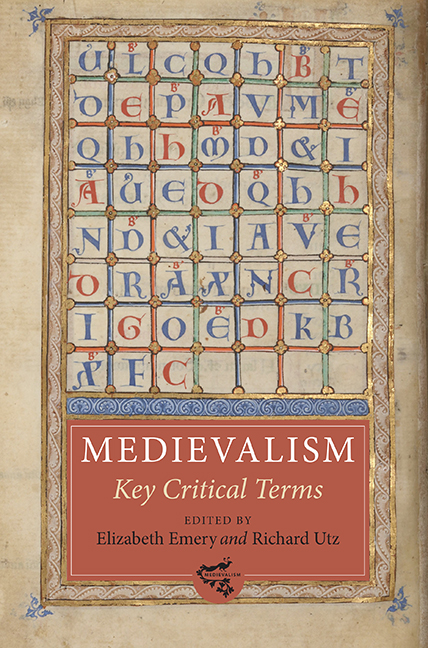Book contents
- Frontmatter
- Dedication
- Contents
- List of Illustrations
- List of Contributors
- Making Medievalism: A Critical Overview
- 1 Archive
- 2 Authenticity
- 3 Authority
- 4 Christianity
- 5 Co-disciplinarity
- 6 Continuity
- 7 Feast
- 8 Genealogy
- 9 Gesture
- 10 Gothic
- 11 Heresy
- 12 Humor
- 13 Lingua
- 14 Love
- 15 Memory
- 16 Middle
- 17 Modernity
- 18 Monument
- 19 Myth
- 20 Play
- 21 Presentism
- 22 Primitive
- 23 Purity
- 24 Reenactment
- 25 Resonance
- 26 Simulacrum
- 27 Spectacle
- 28 Transfer
- 29 Trauma
- 30 Troubadour
- Index
- Medievalism
15 - Memory
Published online by Cambridge University Press: 08 October 2022
- Frontmatter
- Dedication
- Contents
- List of Illustrations
- List of Contributors
- Making Medievalism: A Critical Overview
- 1 Archive
- 2 Authenticity
- 3 Authority
- 4 Christianity
- 5 Co-disciplinarity
- 6 Continuity
- 7 Feast
- 8 Genealogy
- 9 Gesture
- 10 Gothic
- 11 Heresy
- 12 Humor
- 13 Lingua
- 14 Love
- 15 Memory
- 16 Middle
- 17 Modernity
- 18 Monument
- 19 Myth
- 20 Play
- 21 Presentism
- 22 Primitive
- 23 Purity
- 24 Reenactment
- 25 Resonance
- 26 Simulacrum
- 27 Spectacle
- 28 Transfer
- 29 Trauma
- 30 Troubadour
- Index
- Medievalism
Summary
ACCORDING TO PAUL ZUMTHOR, the Middle Ages occupies a specific position in our collective memory since this period provides the most obvious term of comparison for readers from the end of the twentieth century and the early twenty-first century.1 Modern medievalism grew in Europe and the United States at the end of the twentieth century, when Western societies began to feel the uncertainty of the future and the distance of the medieval past. According to Pierre Nora, since the 1970s and 1980s, “our present time [has been] promoted and doomed to memory, that is fetishism of traces, of historian obsession, of patrimonial capitalization […] Everything [has] become historical, deserves to be remembered, and to be kept in memory.” Are these two phenomena – the growing importance of memory and medievalism – connected?
Memory (Latin memoria, Greek mnēmē) may be defined as the faculty to preserve and evoke representations of past and absent things – facts or states of mind – and bring them to the present: to presentify and actualize them; or, to put it briefly, to keep information in mind and recall it. Still, memory, as “conceptual crossroads,” belongs to multiple fields and possesses multiple applications: in biology (heredity, neurophysiology), history and psychology, social sciences and humanities, modern technology (computers). Throughout the twentieth and the twenty-first centuries, the concept has expanded by analogy and metaphor.
As Pierre Nora has remarked, it is not possible to reduce memory to a mere opposition to oblivion or to a shared experience. Memory is best understood in conceptual pairings: present and past, present and future, cause and effect, spontaneity and will, private and public, remembering and forgetting, praise and criticism, orality and writing. Memory is both a cause and an effect; it is a synonym of remembrance, like vestige, remnant, trace, or remanence. More precisely, it is usually conceived, after Aristotle, either as mnēmē – a spontaneous remembrance, close to an affection (Ricoeur) – or anamnesis, that is the result of a voluntary effort to recall.
Nevertheless, these related concepts are not antonyms; they are to be understood in a dialectics with forgetting. Memory is also made of oblivion because it is sometimes discontinuous, as the fortune of texts, writers, or motives reveals: their history is made of disappearances.
- Type
- Chapter
- Information
- Medievalism: Key Critical Terms , pp. 133 - 140Publisher: Boydell & BrewerPrint publication year: 2014



